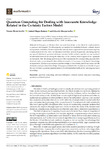Quantum Computing for Dealing with Inaccurate Knowledge Related to the Certainty Factors Model

Use this link to cite
http://hdl.handle.net/2183/29419Collections
- Investigación (FIC) [1678]
Metadata
Show full item recordTitle
Quantum Computing for Dealing with Inaccurate Knowledge Related to the Certainty Factors ModelDate
2022Citation
Moret-Bonillo, V.; Magaz-Romero, S.; Mosqueira-Rey, E. Quantum Computing for Dealing with Inaccurate Knowledge Related to the Certainty Factors Model. Mathematics 2022, 10, 189. https://doi.org/10.3390/math10020189
Abstract
[Abstract] In this paper, we illustrate that inaccurate knowledge can be efficiently implemented in a quantum environment. For this purpose, we analyse the correlation between certainty factors and quantum probability. We first explore the certainty factors approach for inexact reasoning from a classical point of view. Next, we introduce some basic aspects of quantum computing, and we pay special attention to quantum rule-based systems. In this context, a specific use case was built: an inferential network for testing the behaviour of the certainty factors approach in a quantum environment. After the design and execution of the experiments, the corresponding analysis of the obtained results was performed in three different scenarios: (1) inaccuracy in declarative knowledge, or imprecision, (2) inaccuracy in procedural knowledge, or uncertainty, and (3) inaccuracy in both declarative and procedural knowledge. This paper, as stated in the conclusions, is intended to pave the way for future quantum implementations of well-established methods for handling inaccurate knowledge.
Keywords
Quantum computing
Artificial intelligence
Certainty factors
Inaccurate reasoning
Quantum rule-based systems
Artificial intelligence
Certainty factors
Inaccurate reasoning
Quantum rule-based systems
Description
This article belongs to the Special Issue Advances in Quantum Artificial Intelligence and Machine Learning
Editor version
Rights
Atribución 4.0 Internacional






